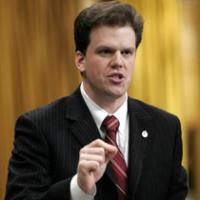“The federal Liberals are calling for an investigation to determine who paid for a radio ad campaign in Ontario that attacked the federal government’s action to fight climate change in the 2006 election,” CanWest Global’s Mike de Souza reports here.
Further to our story of yesterday (see post below) about an Elections Canada investigation into potentially illegal interference by the Friends of Science (FOS), federal Liberal Mark Holland, inset, is now suggesting that a Parliamentary hearing may be necessary to find out who funnelled money into Barry Cooper’s University of Calgary FOS slush fund .
The oily origin of that money has been well-documented, by the Globe and Mail, but it would still be fun to see the cancelled cheques – and to have Cooper and the FOS organizers called to account.
Subscribe to our newsletter
Stay up to date with DeSmog news and alerts







